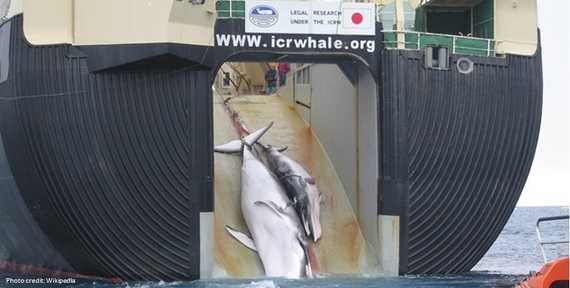The World Conservation Congress passed with overwhelming support a motion today denouncing the killing of whales under the guise of science.
The motion censures Japan's "scientific research" whaling, which Japan uses to evade the international ban against commercial whaling. Among other things, the motion calls on Japan to revoke its existing lethal whale research programs. It also calls upon all states to refrain from engaging in research programs that kill whales.
The expertise and reputation of the World Conservation Congress makes this motion especially noteworthy. Hosted every four years by the world's largest network of conservation experts - the 1,300 member International Union for the Conservation of Nature (IUCN) - the World Conservation Congress brings together thousands of scientists and other environmental professionals from over 170 countries, including members from 89 states, 129 government agencies, and over 1,000 domestic and international non-governmental organizations. The IUCN is considered the global scientific authority on conservation issues due to both its diverse membership and its reliance on over 16,000 experts from a range of disciplines such as species survival, ecosystem management, and social and economic policy.
This international clout makes the motion - entitled "Concerns about whaling under special permits" - yet another compelling condemnation of Japan's whaling.
The IUCN joins other illustrious international bodies in denouncing Japan's whaling. The International Whaling Commission (IWC) has adopted 22 resolutions over the years calling on Japan to half or restrict its "scientific research" whaling. And in a 2014 landmark decision, the United Nations International Court of Justice (ICJ) found that Japan's research whaling program in the Antarctic (JARPA II) was illegal. Although Japan initially agreed to abide by the ICJ judgement (and conducted only nonlethal research the following season), it later denounced the ICJ's jurisdiction over disputes involving living marine resources.
Japan then issued itself a new research plan that allows it to kill 333 minke whales per year.
The IWC Scientific Committee - the world's foremost experts on whales - reviewed Japan's new plan and concluded that the lethal sampling of whales was not scientifically justified. Nonetheless, Japan resumed its "scientific research" whaling in December 2015 and killed its entire self-allocated quota of 333 minke whales last season - including 200 pregnant females.
Since the moratorium on commercial whaling took effect in 1986, Japan has killed over 15,000 whales under the guise of science.
Enough whales have died.
The decisive action today by the World Conservation Congress harpoons Japan's "scientific research" whaling program and encourages the use of non-lethal research options.
It also reflects an international scientific consensus that there is no legitimate reason to kill thousands of whales in order to study them. The IWC has spoken. The World Court has spoken. And now, the world's leading conservation organization has spoken.
The message is clear: it's time to stop killing whales.

